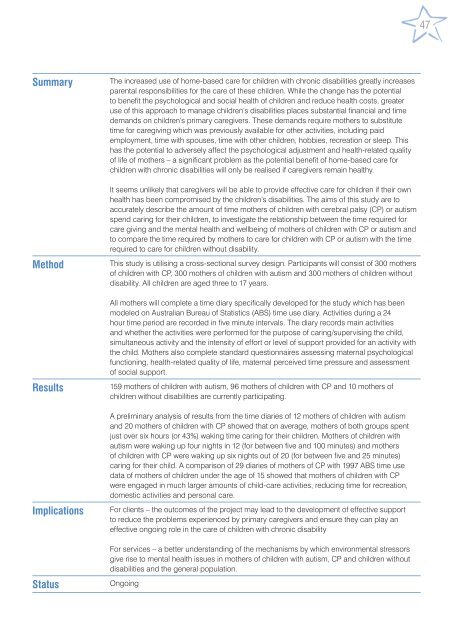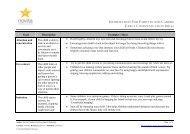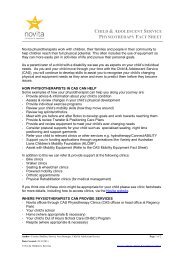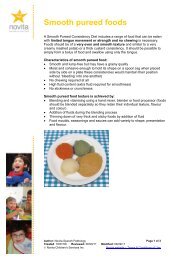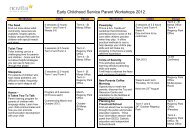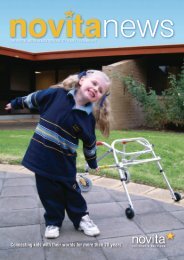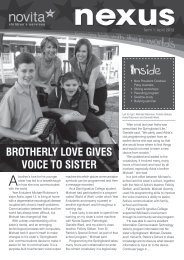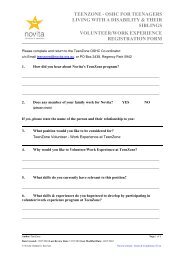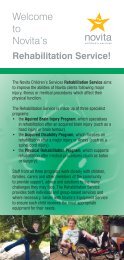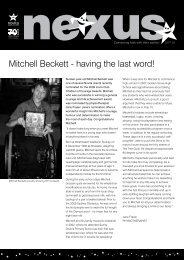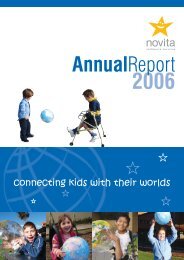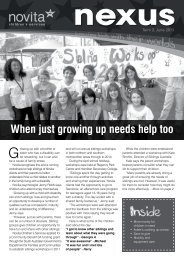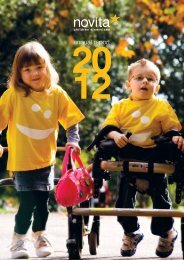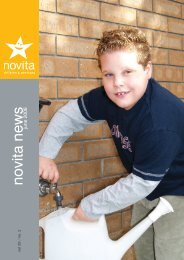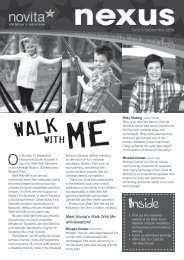Novita Research Report - 2004 to 2007 - Novita Children's Services
Novita Research Report - 2004 to 2007 - Novita Children's Services
Novita Research Report - 2004 to 2007 - Novita Children's Services
- No tags were found...
You also want an ePaper? Increase the reach of your titles
YUMPU automatically turns print PDFs into web optimized ePapers that Google loves.
47SummaryMethodResultsImplicationsStatusThe increased use of home-based care for children with chronic disabilities greatly increasesparental responsibilities for the care of these children. While the change has the potential<strong>to</strong> benefit the psychological and social health of children and reduce health costs, greateruse of this approach <strong>to</strong> manage children’s disabilities places substantial financial and timedemands on children’s primary caregivers. These demands require mothers <strong>to</strong> substitutetime for caregiving which was previously available for other activities, including paidemployment, time with spouses, time with other children, hobbies, recreation or sleep. Thishas the potential <strong>to</strong> adversely affect the psychological adjustment and health-related qualityof life of mothers – a significant problem as the potential benefit of home-based care forchildren with chronic disabilities will only be realised if caregivers remain healthy.It seems unlikely that caregivers will be able <strong>to</strong> provide effective care for children if their ownhealth has been compromised by the children’s disabilities. The aims of this study are <strong>to</strong>accurately describe the amount of time mothers of children with cerebral palsy (CP) or autismspend caring for their children, <strong>to</strong> investigate the relationship between the time required forcare giving and the mental health and wellbeing of mothers of children with CP or autism and<strong>to</strong> compare the time required by mothers <strong>to</strong> care for children with CP or autism with the timerequired <strong>to</strong> care for children without disability.This study is utilising a cross-sectional survey design. Participants will consist of 300 mothersof children with CP, 300 mothers of children with autism and 300 mothers of children withoutdisability. All children are aged three <strong>to</strong> 17 years.All mothers will complete a time diary specifically developed for the study which has beenmodeled on Australian Bureau of Statistics (ABS) time use diary. Activities during a 24hour time period are recorded in five minute intervals. The diary records main activitiesand whether the activities were performed for the purpose of caring/supervising the child,simultaneous activity and the intensity of effort or level of support provided for an activity withthe child. Mothers also complete standard questionnaires assessing maternal psychologicalfunctioning, health-related quality of life, maternal perceived time pressure and assessmen<strong>to</strong>f social support.159 mothers of children with autism, 96 mothers of children with CP and 10 mothers ofchildren without disabilities are currently participating.A preliminary analysis of results from the time diaries of 12 mothers of children with autismand 20 mothers of children with CP showed that on average, mothers of both groups spentjust over six hours (or 43%) waking time caring for their children. Mothers of children withautism were waking up four nights in 12 (for between five and 100 minutes) and mothersof children with CP were waking up six nights out of 20 (for between five and 25 minutes)caring for their child. A comparison of 29 diaries of mothers of CP with 1997 ABS time usedata of mothers of children under the age of 15 showed that mothers of children with CPwere engaged in much larger amounts of child-care activities, reducing time for recreation,domestic activities and personal care.For clients – the outcomes of the project may lead <strong>to</strong> the development of effective support<strong>to</strong> reduce the problems experienced by primary caregivers and ensure they can play aneffective ongoing role in the care of children with chronic disabilityFor services – a better understanding of the mechanisms by which environmental stressorsgive rise <strong>to</strong> mental health issues in mothers of children with autism, CP and children withoutdisabilities and the general population.Ongoing


